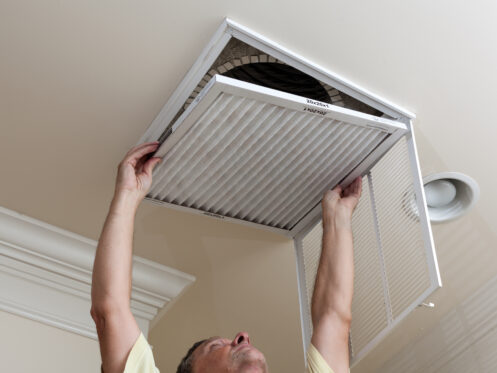Air pollution is a growing concern in today’s world. HEPA filters are a type of air filter that has gained popularity for their ability to silently purify the air we breathe. These filters can help get rid of any airborne contaminants in your home. Here are a few points you need to know about HEPA filters and how they can help to maintain a healthy living environment.
What Are HEPA Filters?
HEPA stands for high-efficiency particulate air. These filters are often used in air purification systems. They are known for their ability to trap very small particles at 0.3 micrometers with an efficiency level of 99.97%. If you want to put that into perspective, human hair is about 50-70 micrometers in diameter.
These filters effectively capture even the tiniest airborne pollutants that are too small to be seen by the naked eye. Due to their effectiveness, HEPA filters are commonly used in homes, offices, hospitals, and other applications where clean air is a top priority. They help to remove allergens, dust, pet dander, and other irritants from the air. In turn, that makes the environment safer and more comfortable for everyone.
How are HEPA filters so effective? The filter’s design and composition have a dense maze of fibers. Larger particles, those larger than 0.3 micrometers, are too big to navigate the twists and turns of the filter fibers. Instead, as the air flows through, they collide and stick to the fibers, getting trapped in the filter. This is known as interception.
On the other hand, smaller particles are forced to follow the airstream and come in close contact with the filter fibers due to their size. This causes them to stick to the fibers and be removed from the air. The process is also called interception and is effective for particles between 0.1-0.3 micrometers.
For ultrafine particles, motion causes them to collide with gas molecules and filter fibers. This movement ensures that the filter captures even these tiny particles. This process is called diffusion.
You can find HEPA filters in everything from air purifier units to vacuum cleaners. During the COVID-19 pandemic, many hospitals, homes, and other buildings used these filters to help improve the quality of air. While these threats have diminished, many people still use HEPA filters in their living and working spaces.
HEPA Filters in Different Applications
One of the most common applications of HEPA filters is in residential heating, ventilation, and air conditioning (HVAC) systems. You can purify the air circulating throughout your living space by installing HEPA filters in your home’s HVAC system. As a result, you can create a healthier environment for your family.
Some other places where you might find HEPA filters include the following.
Workplaces
Businesses and offices also benefit from using HEPA filters to maintain a clean and healthy working environment. Since employees spend considerable time indoors, air quality is important for productivity and overall well-being. HEPA filters play a role in achieving and maintaining those high indoor air quality standards.
Healthcare Facilities
Hospitals and healthcare facilities heavily rely on HEPA filters to maintain sterile environments. These filters prevent the spread of airborne diseases. They can protect both patients and healthcare professionals. HEPA filters are essential in surgery rooms, isolation units, and other critical areas.
Laboratories
Research laboratories and clean room facilities rely heavily on HEPA filters to maintain purity. These filters control the concentration of airborne contaminants. In turn, that can protect the integrity of experiments and manufacturing processes.
Airplanes
During air travel, passengers are often confined to a small space where air quality can be compromised. Some aircraft ventilation systems incorporate HEPA filters to minimize the risk of airborne infections and improve air quality during flights.
Vehicles
These filters are integrated into the ventilation systems of cars, and they work efficiently to capture tiny particles, such as dust, pollen, and pollutants. This helps ensure that the air inside the vehicle is clean and safe for passengers. By filtering out allergens and pollutants, HEPA filters provide a more comfortable driving experience.
Are All Filters the Same?
When it comes time to purchase, filters and their labels can be confusing. Some manufacturers may use items such as “HEPA-type” or “HEPA-like.” However, those products have not met the rigorous testing standards of actual HEPA filters.
When you see the “True HEPA” label on a filter, it guarantees you are purchasing a high-quality product. The True HEPA standard is the highest one in the industry. A filter with this label must be able to capture at least 99.97% of particles as small as 0.3 micrometers.
The Impact of HEPA Filters on Energy Efficiency
HEPA filters purify indoor air and help make HVAC systems energy-efficient. Proper filtration can improve system performance. As a result, that can reduce energy consumption in your home.
HEPA filters prevent the accumulation of dust and debris on heating and cooling system components. In turn, that reduces the strain on the system. You will have improved efficiency and could extend the lifespan of HVAC equipment.
Clean filters allow for better airflow. Improving airflow contributes to more consistent temperature control and a more comfortable living or working space.
When HVAC systems operate efficiently, they consume less energy. Regularly replacing or cleaning HEPA filters will maintain indoor air quality. Plus, you will see lower utility bills in a few short months.
Choosing the Right HEPA Filter for Your HVAC System
When it comes time to choose a HEPA filter, you want to get the right one for your home or business. Before you purchase, make sure that the HEPA filter you select fits your HVAC system’s specifications. You can always check the dimensions and compatibility to confirm It is the right one for your home.
Also, don’t forget about the Minimum Efficiency Reporting Value (MERV). This value indicates a filter’s ability to capture particles of different sizes. While HEPA filters have their own efficiency rating, the MERV rating is another tool to make sure you have a product that meets your filtration needs.
Don’t Forget About Regular Maintenance
HEPA filters are highly effective in removing airborne particles and pollutants from the air. However, if these filters are not maintained properly, their performance can decline over time. You will want to establish a routine for replacing or cleaning the filters to ensure their effectiveness.
This routine maintenance will help extend the lifespan of the filters. Plus, you can make sure that they continue to provide clean and healthy air for you and your family. Always follow the manufacturer’s guidelines for maintaining and replacing HEPA filters. In many cases, you will have to change these filters about every one to three months.
As the issue of air pollution continues to grow, HEPA filters play an important role in maintaining healthy living spaces.
If you want to know more about your options for a healthier and cleaner environment for your home, reach out to Cozy Home Services. We want to make sure your Vacaville, CA, home has optimal indoor air quality. Whether you need a HEPA filter or another solution, we can help create a comfortable living space for your family. Along with that, we can help with AC or heating repair, installation, and maintenance services. Contact us at Cozy Home Services to schedule an appointment.


